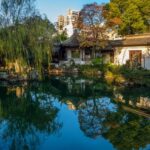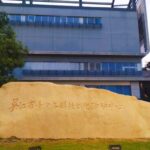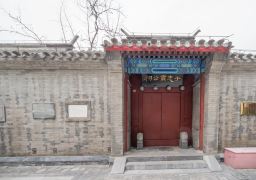Zhang Taiyan, a prominent modern democratic revolutionary and thinker, is commemorated at the Zhang Taiyan Memorial Hall. Nestled at the northern foot of Nanping Mountain, the memorial hall stands in reverence to his legacy. Behind the hall lies Zhang Taiyan’s tomb, a dome-shaped structure made of concrete, adorned with several seal characters ‘Zhang Taiyan’s’ that he personally inscribed on the tombstone before his death.
Zhang Taiyan passed away in Suzhou in June 1936 due to illness and was initially buried in the back garden of his former residence. In April 1956, his remains were reburied at their current location, and the tomb underwent renovation in 1981.
The memorial hall, facing north, is designed along the original tomb path as its central axis, connecting the front and back sections. The architectural layout reflects a traditional northern courtyard house, merged with the construction techniques characteristic of Jiangnan gardens. The buildings, featuring Ming and Qing architectural styles, are distinguished by their white walls and black tiles, embodying a blend of simplicity, solemnity, gracefulness, and exquisiteness.

Within the memorial hall, visitors can explore an exhibition room dedicated to Zhang Taiyan’s life story, another showcasing his authentic works, and a third celebrating his academic achievements. The hall houses over 1,000 cultural relics and 2,000 data photos, including the unique Chinese copy of Zou Rong’s ‘Revolutionary Army’ and ‘Yan Shu’, ‘Gao Lan Shi Notes’, and other manuscripts and calligraphy authentic works of Zhang Taiyan, which are considered highly precious.
This hall stands as a repository rich in cultural relics of Mr. Zhang Taiyan in China. The opening hours are from 08:30 to 16:30 on Mondays, Wednesdays to Sundays throughout the year; the hall is closed all day on Tuesdays.

—
The mandatory constraints are:

1. No translation is required; the content must remain in English.
3. The result should not start or end with phrases like “According to your request,” “I have,” “Please note,” or any Chinese phrases.
—









